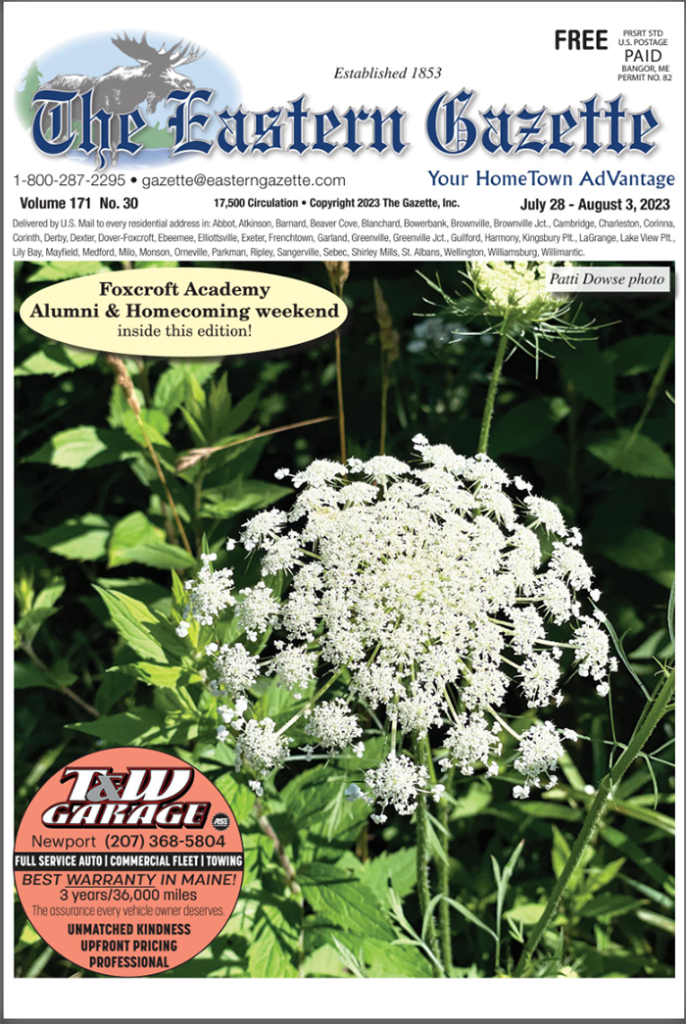Local 4-H Programs Featured in “The Eastern Gazette”
4-H programs explore archery, careers, civic engagement and more

By Sheila D. Grant, Eastern Gazette Staff Reporter
DOVER-FOXCROFT – Like many programs, the University of Maine Cooperative Extension’s 4-H programs experienced a lull during the COVID-19 pandemic. Now that people are able to meet in person again, new leadership is emerging and new programs are being offered locally, as well as statewide programs offered in a hybrid virtual/in-person format.
While 4-H has strong ties to agriculture, kids aged 5 to 18 can join without needing to live on a farm or in a rural area, and without raising livestock, said Sheila Norman, the 4-H Professional for Penobscot and Piscataquis counties. Civic engagement, public speaking, science, engineering, robotics and more have been offered through 4-H in addition to programs related to the care of plants and animals.
“Any spark that a child has is a project they can do in 4-H,” Norman said. “If we don’t have a leader for a topic, or if they live in an area where we don’t have a 4-H Club, we offer an independent membership. The youth would have an adult mentor – a parent, grandparent or other adult with knowledge of the topic they want to learn about – and when they enroll, we have a form where they would choose some goals related to their topic, what specifically do they want to learn and how will they learn it, and then report in. We would check in with them once or twice during the project year, and at the end of the year they would turn in their project record.”
While 4-H offers programs in each county, those lines are not meant to keep kids from nearby towns away, Norman said. For example, kids in nearby Penobscot County towns such as Dexter are welcome to attend Piscataquis County programs.
Some programs, including the YOUth have a Voice, are statewide. YOUth participants meet in person twice, but virtually the rest of the time. The nine-month program is open to teens and recent high school graduates interested in taking a more active role in serving their town, state or nation. Leadership and ways to get involved are taught through teens serving on a board or advisory council, providing input to a policy or rule being developed, or carrying out a community service project, all with assistance from adult mentors.
“Micro-credentials are something we’re working on in 4-H, as well,” said Norman. “I’m using YOUth have a Voice as an example because it’s something I’m personally working with. We have partnered with UMaine for early college credits related to this for students interested in that, and also micro-credentials, I know, have been offered to youth in the Public Speaking program, among others. Micro-credentialing is new, so we’re still learning about that, but it’s definitely something we’re working on expanding.”
Locally, a new volunteer club leader, Elizabeth Fralick, has started the Guilford Community Garden Club for 4-H Clover Buds, ages 5 to 8, “so we are really happy to have that for the little ones to be involved,” Norman said.
“Another of our new leaders is just getting started with an archery club. We’ll be having an informational meeting at 6 p.m. on July 31 here at the Extension office, open to anyone interested in joining us, ages 9 to 18.”
That club will be led by Dover-Foxcroft native Levi Rollins, who recently completed 4-H archery leader training at the 4-H Camp and Learning Center at Bryant Pond.
“One of the things we’ll be looking at once the hubbub of the fair season dies down is that we’ve got a lot of home schoolers among our members and new leaders who’ve been asking about integrating 4-H and homeschooling, so we will definitely be working with those folks on how to make 4-H work with their homeschooling plans,” said Trisha Smith, who worked for Piscataquis County Cooperative Extension in the past as the part-time home horticulturist and rejoined the staff in February as the full-time 4-H Community Education Assistant for Penobscot and Piscataquis counties.
“We also have the Ag Ambassadors program, for kids 14 to 18 who are interested in the Maine food system,” Smith said. “That cohort will meet a few times throughout the year and work on projects independently, and they will meet online, as well.”
Also in the pipeline is a five-week 4-H special interest program in partnership with Northern Light Mayo Hospital that will help kids 12 to 18 explore healthcare-related professions, both direct patient care careers and support positions within the healthcare system. The details are not fully worked out, Norman said.
“4-H professionals and/or volunteers will always be there, but experts from the hospital will be delivering the information,” she said. “Our first meeting is not until October 19. We’re very excited to have that opportunity.”
Another potential new 4-H leader would like to start a club around raising sheep and goats and spinning their wool into yarn.
“And we’ve had some inquiries about a Rabbit Club, so if anyone’s interested, we are looking for a leader and we hope we can organize that, but it’s very much in its infancy,” Norman said.
To become a 4-H volunteer leader and share a skill or interest, adults undergo a background check and a short training via videos and in-person instruction.
“We don’t just throw people in there,” Norman said. “We give them some training and guidance, and then if they want to get started in a club, Trisha and I are available to help with any paperwork, developing curriculum, how to organize club meetings and to help them decide the ages of the children and number of children that would be appropriate for their particular topic of interest.”
Visit the University of Maine Cooperative Extension: 4-H website for more information about 4-H in our community and the state of Maine.
— Reprinted with permission of April Bryer, General Manager, The Eastern Gazette.
